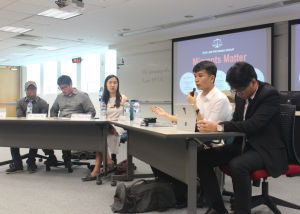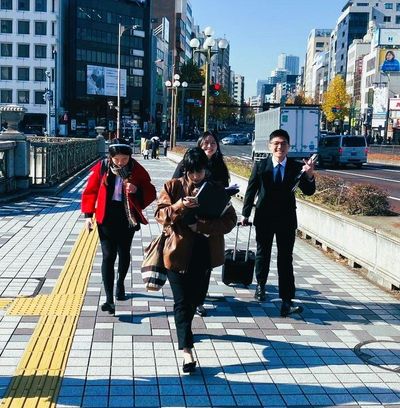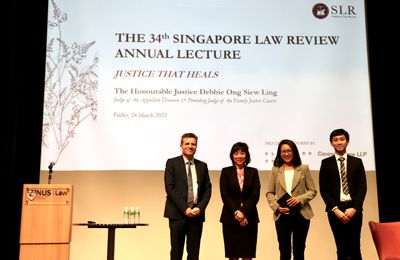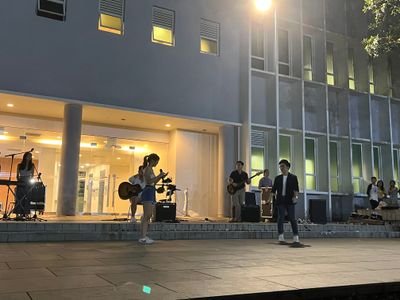On 2 October 2017, the NUS Pro Bono Group (PBG) commenced its annual Pro Bono Awareness Week (PBAW), which aims to raise awareness about the various projects and beneficiaries under the multiple branches of the PBG. This year, we expanded our outreach to students at the Singapore University of Social Sciences, Singapore Management University and non-law NUS students, because we believe that everyone can learn from and participate in the pro bono ecosystem.
PBAW Seminar Series
In line with the event’s theme of ‘Challenging All Assumptions’, PBG hosted 3 panel discussions that critically discussed issues surrounding migrant worker and sex worker rights, as well as rehabilitative opportunities for past offenders. We sought to challenge rooted assumptions students may have about the legal rights and challenges these vulnerable groups face, so as to inspire participants to tackle these issues in their existing projects, or even to pilot new ones.
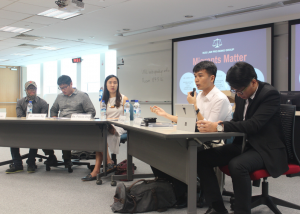
A diverse panel at the ‘Migrants Matter’ seminar
First, in our installation of 3 panel discussions, ‘Migrants Matter‘ invited panelists to weigh in on legal obstacles faced by migrant workers in Singapore and the concomitant legal and policy solutions enacted to address them. The panel included Mr. Gabriel Koh, Senior Assistant Director at the Joint Operations Division of the Ministry of Manpower, Mr. Jevon Ng, a social work executive at the Humanitarian Organisation for Migrant Economics (HOME), Ms. Felicia Ong, an associate at Beacon Law Corporation, and Rahman, a construction worker currently volunteering for HOME.
Participants were apprised of the harsh realities of the employment landscape, which included problems like late payment of salaries, insufficient rest days, or even inadequate medical treatment of workplace injuries. The session was enriched by Rahman’s anecdotal sharings about, inter alia, the third degree burns he suffered at work and the difficulties he faced when claiming compensation for his injuries.
In response to the varied issues raised, the panel identified new initiatives, most notably the Employment Claims Tribunal (ECT). The ECT aims to provide employers and workers with an efficient and low-cost mechanism to resolve their disputes. One notable feature of the ECT is the introduction of compulsory mediation to help reach a settlement agreement. Only if the mediation fails, will the employee’s claim proceed to the tribunal.
Mr. Gabriel Koh and Mr. Jevon Ng also crossed swords over the issue of whether the government was doing enough for these migrant workers. Jevon argued that recent changes to the law fell short of achieving their desired aims, while Gabriel stressed resource limitation considerations which the government had to balance.
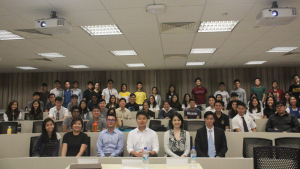
Panellists and participants at the ‘Second Chances’ panel discussion
Next in our seminar series was ‘Second Chances’, which set out to challenge stereotypes against ex-offenders, and to evaluate how the criminal justice system, as well as policy solutions, have helped to rehabilitate offenders and facilitate their re-entry into society.
The panel in session included Ms. Candy Lim, Assistant Manager Youth Residential Service/ Rehabilitation and Protection Group at the Ministry of Social and Family Development, Mr. Ng Shi Yang, a Criminal Legal Aid Scheme (CLAS) Advocate and Mr. Darren Tan Tho Eng, an associate form TSMP Law Corporation.
Notwithstanding existing legislative and policy frameworks to enable rehabilitation of offenders, the panel unanimously stressed the difficulty of ensuring a positive family environment, especially for youth offenders, the conundrum of eliminating offenders’ stereotypes against themselves, and the need to mobilise both legal and community resources to champion criminal rehabilitation. The panel also lamented the difficulty of putting criminal rehabilitation on the political agenda, as well as a complementary need to encourage ground-up initiatives to reach out to ex-offenders in the community.
Looking ahead, the panel raised a swathe of legislative and policy measures which may rejuvenate the rehabilitative process. Ideas raised included expanding the category of offences which are entitled to community-based sentences so as to provide more recourse to non-custodial sentences, targeted recreational or skills-based programmes for ex-offender communities and greater legal awareness among youths.
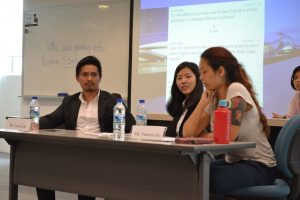
Ms. Vanessa Ho weighing in on some of the issues raised at the ‘Sex Workers are Human Too’ seminar
Concluding our seminar series, and PBAW 2017, was ‘Sex Workers are Human Too’ on 13 October. Our lively panelists, Ms Vanessa Ho, Project Director of Project X, and Mr Leon Koh Weijin, a lawyer who has provided legal aid for Project X for 2 years, shared candidly on the landscape of sex work in Singapore. We realised that the problems sex workers faced went beyond the legality of the work they engaged in – issues of police abuse in the interrogation process and discrimination during profiling of sex workers at the immigration checkpoint based on indicators such as nationality and financial status were also pressing concerns sex workers faced.
While these problems seemed insurmountable, the panel encouraged participants to take small steps towards tackling this issue, through engaging our Ministers as well as raising awareness to gain wider recognition for the rights of this vulnerable group of persons. Meanwhile, as sex workers navigate the ambiguity of Singapore’s current laws, the best stop-gap measure is to empower them with existing provisions that can lend them aid.
Keramat Dormitory Learning Journey
The Keramat Dormitory Learning Journey on 8 October was a rare opportunity for participants to get a glimpse into the living conditions of migrant workers in Singapore. Participants were privileged to receive a guided tour around the dormitory, including spaces earmarked for workers to cook their own meals and grow their own vegetables.
Over a session of manicures and henna, the workers shared how excited they were to start work in Singapore, but, at the same time, how dearly they missed their families back home. While the students had expected the workers to lament the hardships of working in Singapore, they were instead inspired by stories of courage and sacrifice.
The students were also surprised to find that many of them were fluent in English, and some in Chinese as well! The opportunity to spend an afternoon with the workers has left students with a deeper appreciation of the contributions of migrant workers, and a greater conviction to empower them to work and live in Singapore.
As PBAW draws to a close, NUS PBG would like to express our immense gratitude to all panellists for taking the time out to share their invaluable experiences with our participants, and to all students who participated in PBAW 2017. We hope that PBAW has motivated you to do your part in tackling the many issues affecting various disadvantaged groups in society, and that you will continue to walk with us in our vision to involve, to inform, and to inspire.



